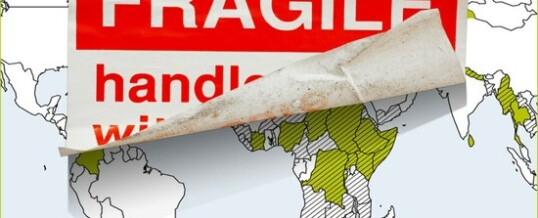
A McLeod Group Blog by Carolyn McAskie, July 8, 2016
In its review of International Assistance, currently underway, Global Affairs Canada asks what role Canada should play in addressing ‘fragile states.’
Fragile states are among the poorest countries—often either conflict-ridden or emerging from conflict. They are unable or unwilling to provide the core functions of a state (governance, safety and security, management of resources) or to deliver basic services to their citizens (health, education, agricultural inputs, economic security). The concept captures both poverty and poor governance, and recognizes the complex inter-relationships between conflict and development and between poverty and environmental degradation.
The OECD States of Fragility report identifies violence, justice, institutions, economic foundations and resilience as key elements of fragility. Encouragingly, in 2010 a group of seven fragile post-conflict states came together to take responsibility for their own development, calling themselves the ‘little g7’ as opposed to the well-known ‘Capital G’ G-7. They now number 20 states and are known as the ‘g7+’. Key donors, including Canada, have joined as partners.
Some fragile states are already the object of concerted international efforts—South Sudan, Somalia, the Democratic Republic of the Congo (DRC), Haiti—while others, such as Syria, Iraq and Afghanistan, represent larger problems. But many others remain neglected. As a starting point, Canada could provide critical leadership in supporting an international discussion to ensure that every country has its share of partners. There have been too many cases of too few donors for a given situation. Between 2003 and 2012, 22% of aid to fragile states went to Afghanistan and Iraq alone. Meanwhile, Burundi, once a peacekeeping success story, falls by the wayside because of the same neglect that contributed to its breakdown in the first place.
Canada’s decision to include peace and security issues in its current review of international assistance represents a welcome nod in the direction of understanding the broader implications of development investment (as pointed out in the recent McLeod blog on Policy Coherence for Development). There is a decade of study showing the linkages between poverty, poor governance, environmental degradation and growing unrest, conflict and even terrorism. There is a better understanding of the cross-border effects of conflict: regional implications (DRC), the spread of disease (Ebola), and mass migration (Syria, Somalia). The cost of conflict prevention versus the cost of conflict has been calculated as 1:4, i.e., pay now or pay four times more later.
Canada’s own law on official development assistance mandates poverty reduction as the central focus, and fragile states are among the poorest of the poor. Failed development in fragile states is a major reason for global failure to meet the Millennium Development Goals, due both to lack of state capacity and donor neglect. It is now agreed that for the Sustainable Development Goals to be met there must be a concerted international effort to address this issue.
If we want to address the problems of fragile states, we need to recognize the work that has already been done within the OECD’s Development Assistance Committee, multilateral organizations, other donors and increasingly the g7+ who are taking charge of their own destiny. We cannot decide in Ottawa what the key issues are. Joint planning is not easy. It takes time and effort.
Addressing the problems of fragile states also requires a fundamental rethinking of gender issues, recognizing the essential role women play in keeping societies together in times of crisis, only to be ignored when peace processes are negotiated and elections are held.
State building is a delicate matter and externally driven models must be avoided. While governance issues are key, people must see real improvements in health, education and food security, as well as justice and human rights. Otherwise, efforts at improving governance will not enhance the legitimacy of local authorities and can lead to increased friction and conflict.
Finally, money matters. Without growth in the International Assistance Envelope, it will be difficult for Canada to say ‘we’re back’. As humanitarian emergencies take a bigger and bigger bite out of the aid budget, development cooperation spending will fall even further unless there is overall budgetary growth. Fragile states constitute a very high proportion of the Security Council’s agenda. If we want a seat at that table, we must provide more than words.
